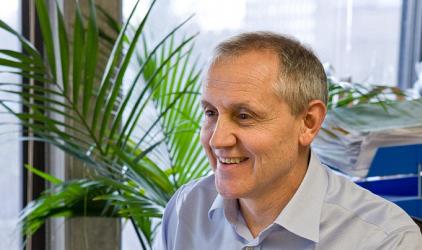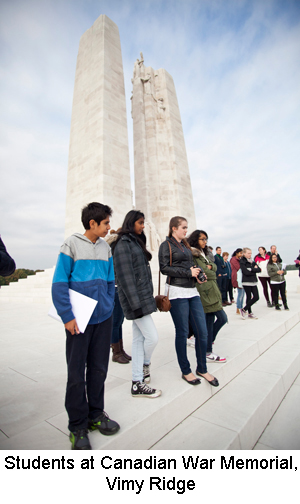History Education in England: National Programs, National Impact? (Stuart Foster)

As a teacher, teacher-educator and researcher, I have been involved in history education for more than 30 years. I have written a few books, published articles, presented at international conferences and taught in universities in the USA and England. I consider myself very lucky to have had the opportunity to devote much of my working life to something I care passionately about. Most importantly, I feel privileged to have worked with and learned from so many outstanding colleagues nationally and internationally.
In truth, however, I have never been sure that anything I have ever said or written has had any positive impact on the field. I’ve often wondered if I’ve made any difference at all! In recent years, however, I have been very fortunate to lead two large-scale national history programs aimed at teachers and learners in schools across England. Armed with significant budgets and staffed by experienced and very able colleagues, these two programs have the potential to make important contributions to how young people encounter and learn from history.
The first, established in 2008 and originally named the Holocaust Education Development Program (HEDP), was granted “centre status” in 2012 by the University of London and is now the Institute of Education’s Centre for Holocaust Education. Since inception it has received almost $10 million US in funding and now employs 14 full-time staff. A vital aspect of our work is that it is informed by the latest scholarship and ongoing research into teaching and learning. Accordingly, based on the responses of more than 2,000 teachers, we published a landmark study into the state of Holocaust education in England, Teaching About the Holocaust in English Secondary Schools: An Empirical Study of National Trends, Perspectives and Practice (2009), which provided the stimulus to develop a high-quality, high impact teacher development program for teachers across the country to specifically address some of the issues and challenges identified. More than 4,000 teachers from every secondary state school in England have now benefitted from our education programs through courses which range from one-day professional development seminars to participation in an in-depth MA module, The Holocaust in the Curriculum. The Centre has also developed an extensive network of “Beacon Schools” to ensure that a meaningful and reciprocal relationship between research, scholarship and practice is sustained and ongoing. Next year, based on the responses of 8,000 teenagers, we will produce a groundbreaking study -- the world’s largest ever -- of students’ knowledge and understanding of the Holocaust, which will undoubtedly help to shape and improve how it is taught and learned about.
 The second program I lead as executive director provides the opportunity for a minimum of two students and one teacher from the more than 4,000 state funded secondary schools in England to visit the battlefields on the Western Front in France and Belgium between 2014 and 2019. The $8.5 million US First World War Battlefield Tours Programme is key to the Government’s plans to commemorate the centenary of the First World War. Understandably, the centerpiece of the program is the 4-day, 3-night visit to France and Belgium. It is, however, important to emphasize that for three reasons we see the program as more than an opportunity to offer a standard school trip.
The second program I lead as executive director provides the opportunity for a minimum of two students and one teacher from the more than 4,000 state funded secondary schools in England to visit the battlefields on the Western Front in France and Belgium between 2014 and 2019. The $8.5 million US First World War Battlefield Tours Programme is key to the Government’s plans to commemorate the centenary of the First World War. Understandably, the centerpiece of the program is the 4-day, 3-night visit to France and Belgium. It is, however, important to emphasize that for three reasons we see the program as more than an opportunity to offer a standard school trip.
First, we believe it offers an authentic and exciting opportunity to think critically about the most effective and meaningful use of historic sites by teachers. Secondly, it is underpinned by the obligation that participating schools carry out a genuine historical enquiry that requires teachers and pupils to engage in extensive pre-tour preparation supported by online professional development modules developed by our team. Accordingly, teachers and pupils have, for example, focused on finding out more about the war’s impact on individual soldiers, family members, or communities. This pre-tour research allows students to visit sites with a clear focus and provides them with a deeper and more informed understanding of the war, its conduct, consequences and significance. Furthermore, using these support materials and other resources, some schools have engaged in broader enquiries that, for example, look to understand the contribution of troops from the Empire and Commonwealth. Thirdly, we recognize that as the tour is a feature of a government-inspired commemoration, it forms part of the fabric of cultural politics, historical consciousness and collective memory. Although popular and academic debates and controversies over how the war should be remembered and understood currently abound, we believe that our program should not shy away from them. Rather, we encourage schools to engage in them, explore divergent historical interpretations and critically examine the evidence upon which certain claims about the past are made.
Although each program has a different focus, they share important features. Above all, they demand that young people do not see the past as something dead and gone and totally irrelevant to their lives. Rather, it requires active enquiry, critical engagement and thoughtful evaluation. Whether or not these programs will ultimately have an impact on how young people encounter and understand the past will be for others to judge. To date, however, the signs are encouraging.
- Se connecter ou créer un compte pour soumettre des commentaires
- Français

